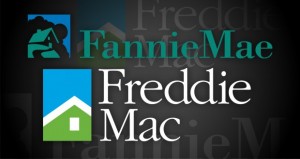 As Fannie Mae and Freddie Mac continue to generate profits in a recovering housing market, a group of community lenders has joined the chorus of advocates calling for the government to revisit the terms of its bailout agreement with the two mortgage giants.
As Fannie Mae and Freddie Mac continue to generate profits in a recovering housing market, a group of community lenders has joined the chorus of advocates calling for the government to revisit the terms of its bailout agreement with the two mortgage giants.
In a recent letter addressed to Treasury Secretary Jack Lew and Mel Watt, director of the Federal Housing Finance Agency (FHFA), the Community Mortgage Lenders of America (CMLA) urged the government to "take immediate action to cure the under-capitalization" of the GSEs by re-amending the payment terms established when they were forced to take a bailout after the crash.
Per the terms of their preferred stock purchase agreements, both Fannie and Freddie are required to turn the majority of their profits over to Treasury. As of the end of this year, the companies will have paid a combined $225.5 billion, tens of billions of dollars more than the amount they drew to avoid going under.
In a statement, CMLA Chair Paulina McGrath said that steps taken to ensure the GSEs' profitability—including driving up guaranty fees—are pointless if those steps aren't contributing to their capital.
"Making mortgage money more expensive is simply locking many borrowers out of the market and serves no benefit to the GSEs," McGrath said. "Renegotiating the [agreement] now is a common sense approach to ensuring the safety and soundness of the GSEs."
As an alternative, CMLA also recommended lowering guaranty fees to remove the "unnecessary tax" the group says is keeping low- and moderate-income borrowers out of the mortgage market.
"Mortgage bankers have now joined the Civil Rights groups and community banks in asking for this important, common-sense change," McGrath said.
In addition to some housing groups, investors in the GSEs have been vocal in the last year about the amended payment agreement, which they say created a windfall for the government at the expense of shareholders who are entitled to the companies' profits.
Some of the biggest GSE investors, including Fairholme Funds, Perry Capital, and the largest non-government shareholder, Pershing Square, have taken their complaints to court. While the Perry Capital and Fairholme suits have been dismissed, both have appealed the ruling.

 theMReport.com Your trusted source for mortgage banking news
theMReport.com Your trusted source for mortgage banking news








